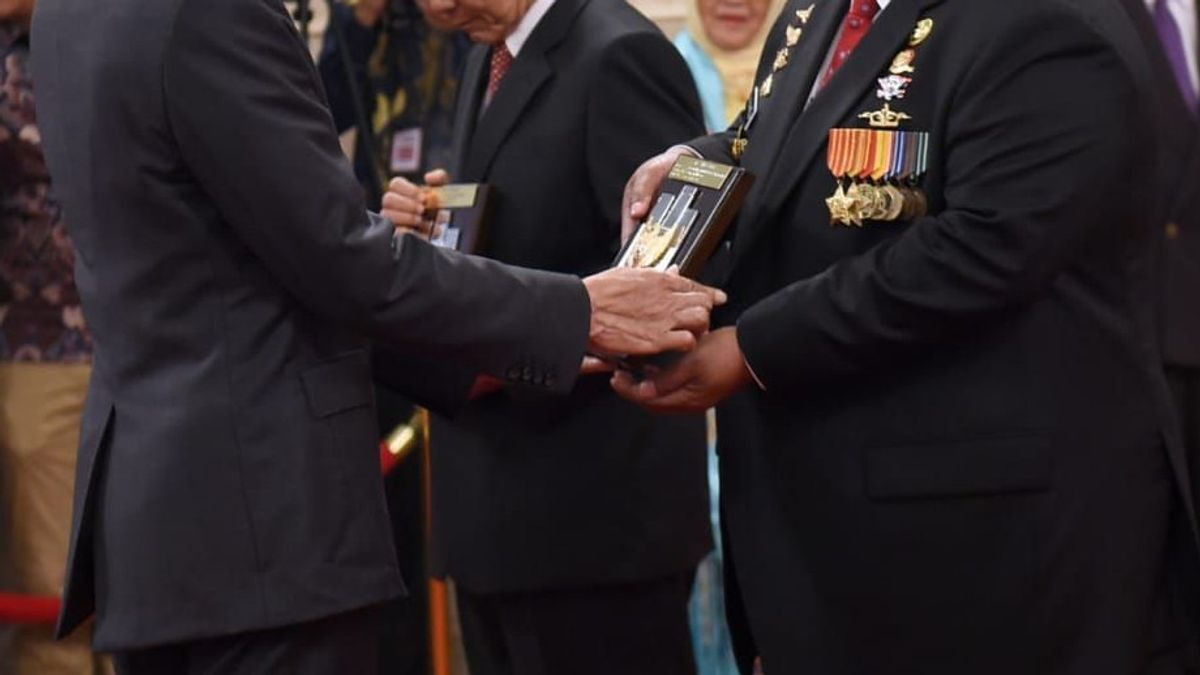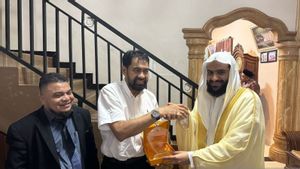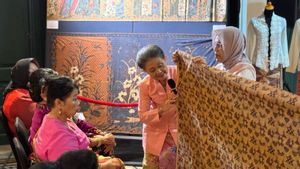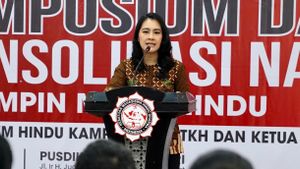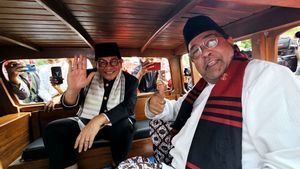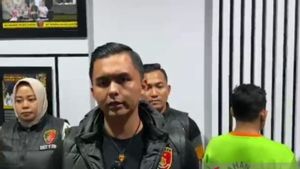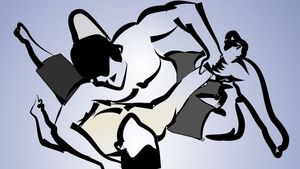JAKARTA - Every year, on Hero's Day, the Indonesian government sets a new national hero title. For this year, 2021, the President of the Republic of Indonesia, Joko Widodo (Jokowi) has designated four new national heroes. They are Kunciututu figures from Central Sulawesi, Sultan Aji Muhammad Idris figures from East Kalimantan, Usmar Ismail figures from DKI Jakarta, and Raden Aria Wangsakara figures from Banten.
The previous year, in 2020, there were six people who were given the title of national heroes, namely Sultan Baabullah, Machmud Singgirei Rumagesan, Retired Raden Said Soekanto Tjokrodiatmodjo, Arnold Mononutu, Mr Sutan Muhammad Amir Nasution, and Raden Mattaher bin Pangeran Kusen bin Adi.
1. Buttonotulu

Citing Tempo, research started in 2017 by Taduloka University, in collaboration with the Parigi Moutong Regency Government, produced a book entitled Bara Resistance in Tomini Bay, Kunciotutu's Struggle against the Dutch.
This book makes the discussion and efforts to appoint Kunciotutu to become a National Hero even stronger. Through the book also found a fact that Kunciotutu had a heroic effort in resisting the Dutch. One of them was Buttonotutu's resistance to Dutch troops in Tomini Bay.
Buttonutu must face the Dutch elite troops called marsose troops. These troops had previously been deployed in the Diponegoro War and the Aceh War. At that time, Kunciotutu faced 170 marsose troops at once. However, Kunciotutu was able to withstand the attacks of the marsose troops.
"Based on the historical history of Kunciotutu's resistance against the Dutch, I think Kunciotutu deserves to be a National Hero," said former regional secretary and Parigi Moutong figure, Taswin Borman during a book review 'Bara Resistance in Tomini Bay, Kunciotutu's Struggle Against the Netherlands' in the hall of the Faculty of Engineering, Tadulako University, Palu. , launched the official website of the government of Parigi Moutong.
The discourse of making Kunciotutu a National Hero has been voiced since the 1990s. However, this is hampered by official documents as primary data. Academics and the public continue to voice for Kunciulu to be awarded the title of hero.
Finally, in 2014, participants of an international seminar at Universitas Kebangsaan Malaysia encouraged history speaker Dr Lukman Nadjamuddin to research Kunciotulu. It is known that many documents about Kunciotulu are kept by the Dutch Government.
2. Sultan Aji Muhammad Idris

The East Kalimantan government stated that the proposed Sultan Aji Muhammad Idris was given the title of national hero because of his role in expelling the Veerenigde Oostindische Compagnie (VOC). Sultan Aji Muhammad Idris was the King of Kutai Kertanegara ing Martadipura who ruled from 1735-1778.
Citing the website of the Kutai Kartanegara Regency Government for Protocol and Leadership Communications section, Sultan Idris not only expelled the VOC in the area under his leadership, but also helped carry out the resistance in the areas of his allies.
Sultan Idris is known to have helped in the expulsion of the VOC by the Wajo Kingdom in South Sulawesi. He is also the leader of the team. In addition, Sultan Idris was known during the resistance only to carry a keris and not use a rifle, spear or anything else.
In 1736, Sultan Idris sent hundreds of troops to help the Wajo Kingdom against the VOC. At that time Sultan Idris even left his pregnant wife to fight. Another historical version also mentions that Sultan Idris left his throne to help the resistance of the Wajo Kingdom.
"The spirit of nationalism in Sultan Idris is truly something to be proud of. A spirit that was still rare at that time in some patriots, many of whom were just how to secure and liberate their own region," quoted from the Kutai Kartanegara Regency Government, Protocol and Communications Section Leader.
3. Usmar Ismail

Usmar Ismail is known as the father of Indonesian cinema. The nickname was given because Usmar Ismail produced amazing films and became a pioneer of modern cinema in Indonesia. Some of the films known to be produced by Usmar Ismail are Pedjuang (1960), Six Djam di Djogja (1956), Tiga Dara (1956), and Dormitory Dara (1958).
Launching the official website of the Language Agency of the Ministry of Education and Culture, Usmar had served in the military and was active in the world of journalism in Jakarta after the proclamation of independence. Together with two colleagues, Syamsuddin Sutan Makmur and Rinto Alwi, they founded a newspaper called Rakyat.
After moving to Yogyakarta, Usmar also had time to establish the Patriot daily and Arena monthly. When he was a journalist, Usmar was thrown into prison by the Dutch because he was accused of being involved in subversion activities. At that time he worked for the Antara news agency and was covering the Dutch-RI negotiations in Jakarta. The incident occurred in 1948.
Over time, Usmar Ismail began to take a more serious interest in cinema. While still living in Yogyakarta, Usmar used to gather in a building in front of Tugu Station every week to discuss the intricacies of film. The discussion partners included Anjar Asmara, Armijn Pane, Sutarto, and Kotot Sukardi. Usmar Ismail died on January 2, 1971 due to illness at the age of almost 50 years.
4. Raden Aria Wangsakara

Quoting Kompas, Raden Aria Wangsakara is known as a scholar, warrior, and founder of Tangerang. In a number of literatures that tell about the Babad Tangerang and Babad Banten, it is stated that Wangsakara is a descendant of the King of Sumedang Larang, Sultan Syarif Abdulrohman.
Aria Wasangkara then fled to Tangerang because he did not agree with his siblings who instead sided with the VOC. He ran away with two of his relatives, Aria Santika and Aria Yuda Negara. After running away, Aria Wasungkara settled on the banks of the Cisadane River.
He was also entrusted by the leader of the Sultanate of Banten, Sultan Maulana Yusuf, to guard the area now known as Tangerang from VOC occupation. Aria Wangsakara has also been an adviser to the Mataram Kingdom who spread Islamic teachings. The activities of Wangsakara to spread Islamic teachings began to be smelled by the VOC in 1652-1653.
The VOC frightened the residents of Lengkong Kyai, part of the Tangerang area, by directing cannon fire at Wangsakara's territory. The battle did not frighten the people of Tangerang and sparked a battle against the VOC. Raden Aria Wangsakara then led the battle for up to seven months and the VOC failed to seize the Lengkong region.
How is one given the title of hero?Citing the VOI article entitled National Heroes, Must Always be Indonesian Citizens?, the determination of the title of a national hero is regulated in Law (UU) number 20 of 2009 concerning Titles of Service and Honors.
Law 20/2009 stipulates a number of conditions that must be met in every nomination of a candidate for a national hero. Referring to the law, what is classified as a general requirement is that the prospective hero is an Indonesian citizen or a person who is fighting in an area that is now the territory of the Republic of Indonesia.
In addition, the person must have moral integrity and exemplary, be of service to the nation and state, behave well, and be loyal and not betray the nation and state. Apart from the existing regulations, there is actually another element that is often the determining factor in awarding the title of a national hero to someone: politics.
Osa Kurniawan, in his book Proclamation: A Reconstruction once highlighted the political element in awarding the title of national hero. He said that during the New Order era, there were some questionable precedents for awarding hero titles. One of them is giving the title of hero to Siti Hartinah (Bu Tien).
"There is one political case as well. The awarding of the title of national hero to Mrs. Tien Suharto. What was her service (Bu Tien) for accompanying Suharto?" Osa told VOI.
*Read other information about NATIONAL or read other interesting articles from Putri Ainur Islam.
Other BERNASThe English, Chinese, Japanese, Arabic, and French versions are automatically generated by the AI. So there may still be inaccuracies in translating, please always see Indonesian as our main language. (system supported by DigitalSiber.id)
